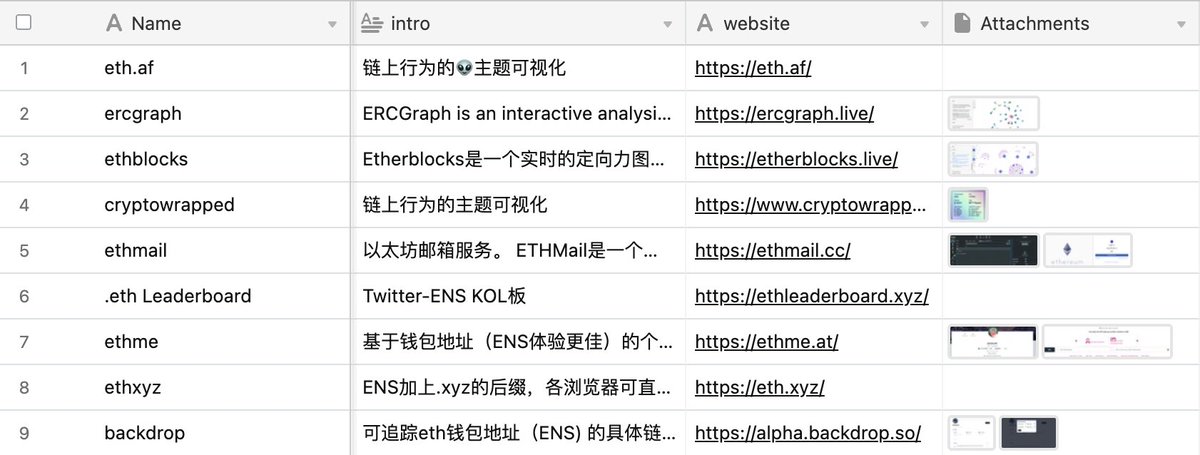
#dailynotes about @ensdomains 🕸️
做了一个数据挖掘小实验(感谢我飞哥 @fushang318!) crypto twitter with ENS names,其中一些地址非常吸引眼球,简单说一下今儿的发现:
做了一个数据挖掘小实验(感谢我飞哥 @fushang318!) crypto twitter with ENS names,其中一些地址非常吸引眼球,简单说一下今儿的发现:

1)两者(就crypto twitter和链上地址)的关系并不对等,神秘人出现。
我指的神秘人是指比如他在社交媒体上是一张白纸,但链上行为像海绵宝宝。比如拥有500个ENS with twitter 个位数的followers,
do the math.
我指的神秘人是指比如他在社交媒体上是一张白纸,但链上行为像海绵宝宝。比如拥有500个ENS with twitter 个位数的followers,
do the math.
这让我思考:我们要追随的KOL似乎要被重新思考什么是K-0-L? 以及KOL们在社交媒体上发出的每个人都能听到的信号,究竟是滞后信号,还是滞后信号?
(别误会,我只是想说📶可以多维度去捕捉,Numbers/traffic parametres 在web3上我觉得就不超前,网络network才是关键-->我会关注能map出它的所有努力
(别误会,我只是想说📶可以多维度去捕捉,Numbers/traffic parametres 在web3上我觉得就不超前,网络network才是关键-->我会关注能map出它的所有努力
2)文本的内容 (#ENS 其实是文本.eth)。我对“words”非常着迷也喜欢琢磨,是因为受到 @sapinker Steven Pinker 在the stuff of thoughts和 Julian Jaynes 在 the origin of consciousness 二分心智中对语言(专有名词、动词)如何反映人的行为动机和行为本身的阐释、以及Jerry Fodor的思想语言说法👇
Language must make dramatic changes in man's attention to things and persons, because it allows a transfer of information of enormous scope.
—Julian Jaynes’ the origin of consciousness in the breakdown of the bicameral mind
—Julian Jaynes’ the origin of consciousness in the breakdown of the bicameral mind
The info of the verb not only organizes the nucleus of the sentence,but determines its meaning.
— Steven Pinker < the stuff of thoughts >
— Steven Pinker < the stuff of thoughts >
大脑中有一种思想语言,思想语言中的一个语词可以是由一个或数个神经元构成的,而概念就是思想语言中的这种语词。——Jerry Fodor
这段是在《直觉泵》译本里面读到的,没找到原文💆。
这段是在《直觉泵》译本里面读到的,没找到原文💆。
#ENS 对我来说就是文字的登记入口,当我们选择并可以“拥有”文本的时候,你需要付出成本,这个时候这些词对你来说“很重要”。我在粗略的浏览(因为数据太多)一些account的时候,发现了一些
显著画像。
显著画像。
这些画像是在我看到这些词时,脑子中即刻反应出的画像,暂且没有和AI bulabula结合。我直接看到了物理学时空间大师(要么他也是LED电视行业的哈哈)、资深金融从业者(或者擅长考试者 噗)、以及真·有钱烧的孩子(倒过来念的是猪.eth ==)
我感觉这些词怎样结合语义网和神经科学,也许能解毒出什么🤔
我感觉这些词怎样结合语义网和神经科学,也许能解毒出什么🤔

当然,一部分词是有意义的,同时有很大一部分词是doesnt make sense的,就是乱序我看不出他写了个啥。但这确是我们每个人mix出的词,这或许反应了一种新型“语言”,基于某种目的被创造出来,被拥有和将来用于“某种用途”。
最后还是饮用Julian Jaynes的话:
语言必将使人对事物和人的关注发生巨大的变化,因为它导致了又一次的大规模信息转移。
语言必将使人对事物和人的关注发生巨大的变化,因为它导致了又一次的大规模信息转移。
• • •
Missing some Tweet in this thread? You can try to
force a refresh







